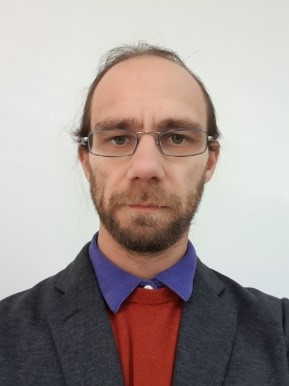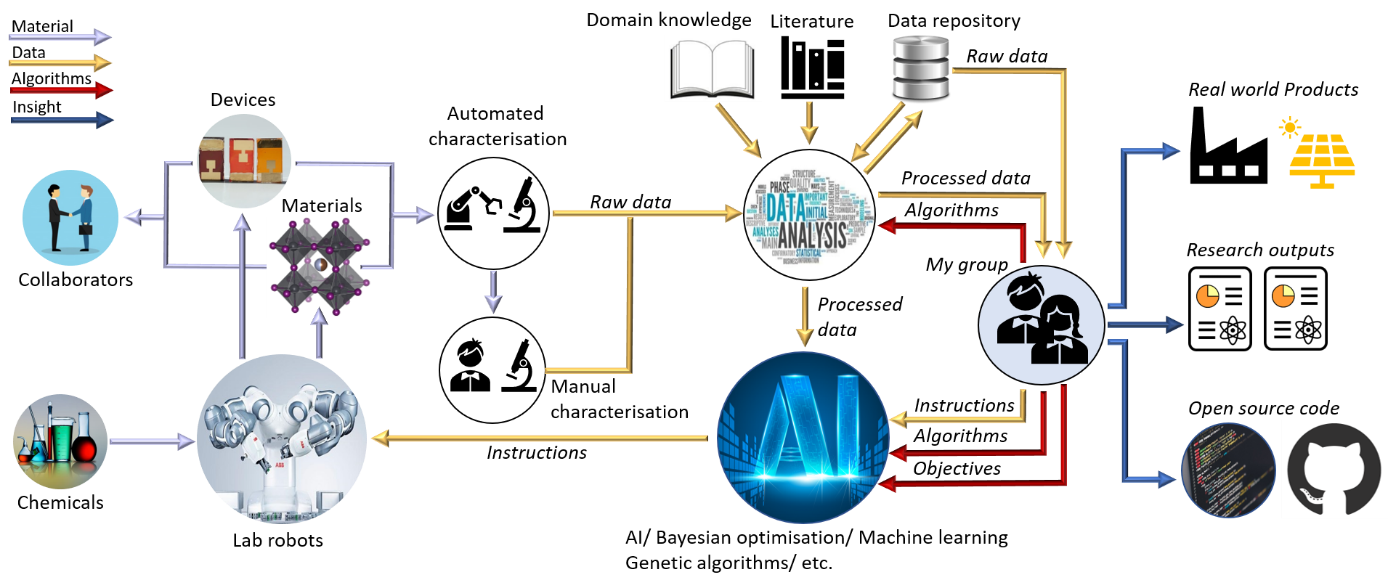
Biography
Jesper Jacobsson obtained a Ph.D. in Inorganic Chemistry at Uppsala University, Sweden, in 2014 with a project focusing on ZnO quantum dots and CIGS-based devices for solar hydrogen production. After his PhD, he has worked as a postdoc at EPFL, Cambridge University, Uppsala University, and Helmholtz Zentrum Berlin, as well as a research engineer at Evolar AB. During his postdoc time he has worked with various aspects of perovskite solar cells including device engineering, tandem integration, data management, and advanced material characterization. From December 2021, he is employed as a professor at Nankai University in the College of Electronic Information and Optical Engineering where he is building a group focused on exploring how to utilize automation and artificial intelligence to improve research in energy materials.
Research profile
The main theme for the Jacobsson lab is closed loop experimentation for accelerated development of material research. This direction is born out of a frustration with the slowness and inefficiency of material discovery and development in combination with a belief that it can be done much better. By utilizing recent developments in artificial intelligence and automation, I think there is a potential to reform much of what we do in material science and bring the field up to a completely new standard in terms of output and research efficiency. The way we will tackle this problem in the Jacobsson lab is a three-stage process.
The first step is lab automation of high throughput combinatorial synthesis and characterisation utilizing flexible robots. The philosophy is that robots are better than humans at doing large amounts of repetitive lab work in a consistent way, like mixing solutions, deposition of thin films, and routine characterisation. From a practical perspective this involves building, assembling, and programming equipment for automating standard procedures, and do this in an affordable and generalisable way.
The second step involves closing the experimental loop by adding a layer of artificial intelligence to the lab automation. This means including evaluation and decision capacity using for example Bayesian optimisation, genetic algorithms, reinforcement learning, and neural networks to guide and set up the next round of experiments on the fly. The idea is that the robotic system synthesises and characterise a sample, after which the data is analysed automatically. Based on the new data, the research objective, and the boundary conditions, the algorithms can then on the fly guide the robotic system to the next experiment to do in order to maximise the insight towards reaching the objective. The overarching goal is to create procedures, protocols, and open-source code that enables autonomous robots for high-throughput synthesis and characterisation in combination with AI-driven automated decision capacity.
The third step involves using this AI-driven automation to accelerate materials research. The primary target here will be halide perovskites for solar cell applications and other energy relevant materials. Examples of research questions involve development of perovskite-perovskite tandem cells, solution processed electron selective contacts in pin-architectures, exploring lead free perovskites, and navigating the chemical space during compositional engineering.

The general idea of “the lab of the future” with the imagined flows of materials data, algorithms, and insight.
Open positions
I am searching for postdocs, PhD students, and master students to join my group.
Are you interested in material science and materials for energy applications?
Are you curious about developing your skills in programming and applied artificial intelligence?
Would you like to work with lab automation for accelerating materials science?
Do you have a background in chemistry, physics, computer science, or in related subjects?
Then this could be the right place for you. If you are interested, please send me an email.
Teaching
· An introduction to the use of data science and artificial intelligence in Chemistry. Course are under development and is planned to be given for the first time during autumn 2022.
Publication statistics
I have so far published 40 papers and one book chapter. My works has so far been cited over 5000 times which give an h-index of 27 (2021 12 31). My updated publication list is found at:
Background
· 2022-Precent. Professor. Nankai University, China. College of Electronic Information and Optical Engineering.
· 2021 Research engineer. Evolar AB, Sweden. Commercialisation of perovskite tandem cells
· 2019-2021 Postdoc. Helmholtz Zentrum Berlin, Germany. Coordinating a large multinational open science project aiming at accelerating perovskite research by making it more open, fair, and accessible.
· 2017-2019. Postdoc. Uppsala University, Sweden. Synthesis, device engineering, and characterization of perovskite solar cells with focus on CIGS-perovskite tandem devices.
· 2016-2017. Postdoc. Cambridge University, UK. Synthesis and characterization of earth abundant catalysts for solar hydrogen production, device engineering, photo-electrochemical cells, and perovskite solar cells.
· 2015-2016. Postdoc. EPFL, Switzerland. Synthesis, device engineering, and characterization of perovskite solar cells.
· 2014-2015. Researcher. Uppsala University, Sweden. Synthesis and characterization of earth abundant catalysts for solar hydrogen production
· 2014 PhD. Inorganic Chemistry. Uppsala University, Sweden. Supervised by Dr. Tomas Edvinsson. Thesis title: Highly Efficient CIGS Based Devices for Solar Hydrogen Production and Size Dependent Properties of ZnO Quantum Dots.
· 2012. Licentiate in Inorganic Chemistry. Uppsala University.
· 2010. Master of Science in Chemistry. Uppsala University.
· 2010. Master of Science in Chemical Engineering. Material Science. Uppsala University.
· 2009. Master of Science in Physics. Uppsala University.
Awards
· 2015. Anna Sundström’s award for best Swedish PhD thesis in inorganic chemistry.
· 2015. Bjurzon’s premium for best PhD thesis in science and technology at Uppsala University.
· 2014. Ångström Academy’s innovation stipend.
· 2013. First poster price at the ISACS12 Challenges in Chemical Renewable Energy.
· 2011. Naturvetarpriset for best Swedish diploma work in chemistry.
· 2010. Kemiska sällskapet i Uppsala’s great price for best diploma work in chemistry.
· 2008. Winner of Teknik-SM, the Swedish mastership in future technology.
2003. Winner of Utställningen Unga Forskare with my final high school project.